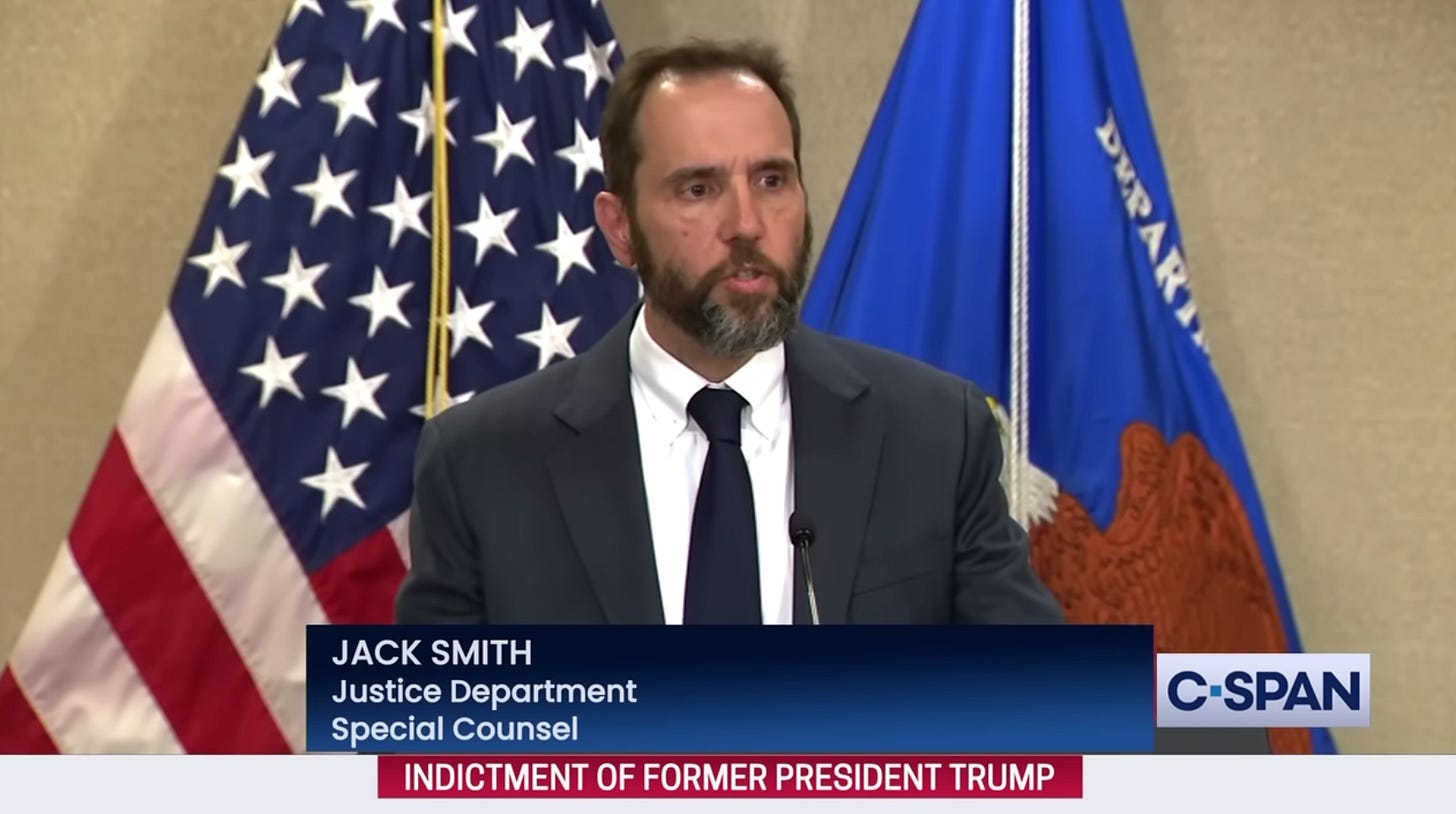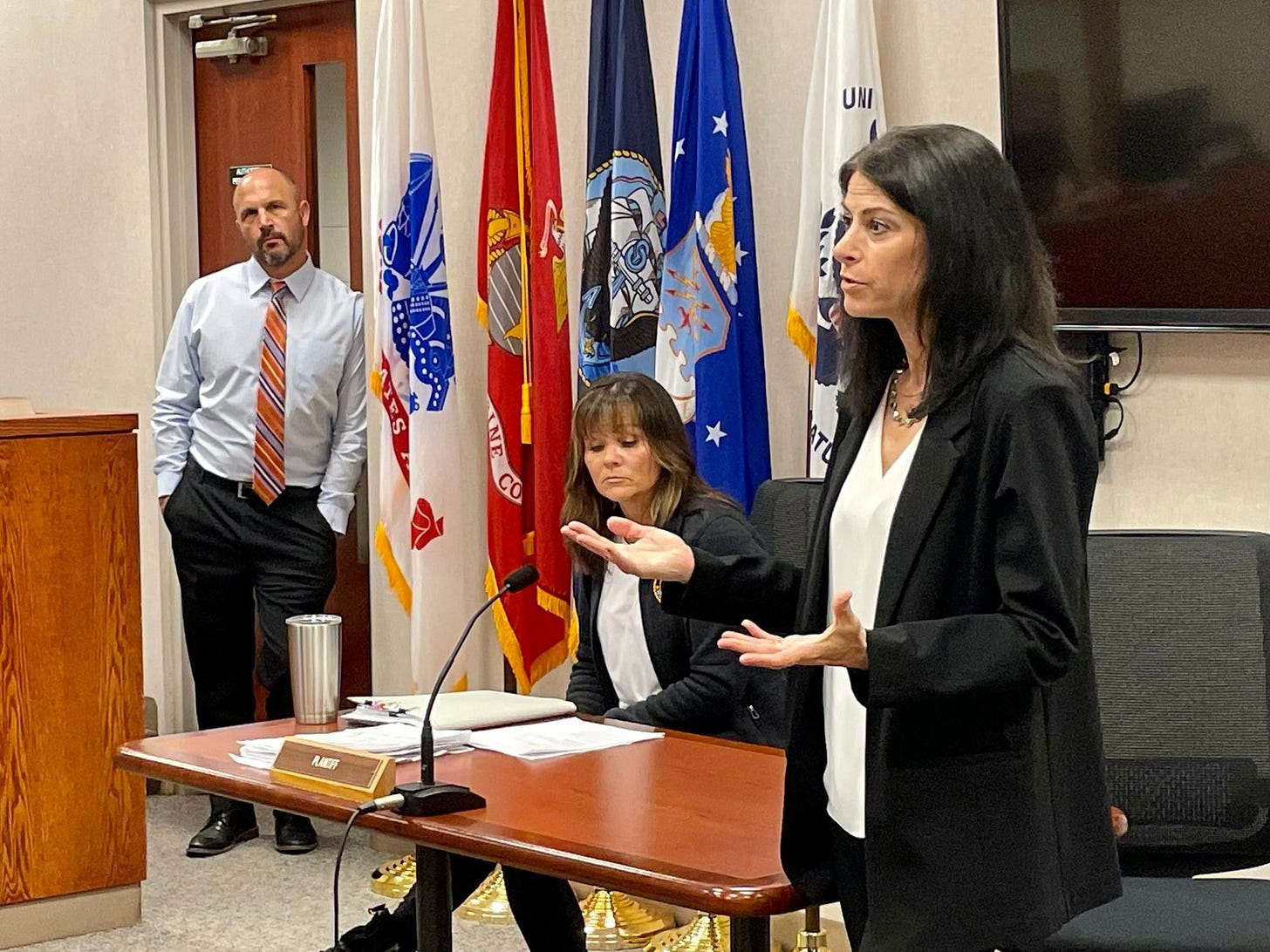What we know about the Trump target letter
Everything we know so far about Donald Trump’s potential third indictment.
Good morning! It’s Wednesday, July 19, 2023. The 2024 elections are 475 days away. If this newsletter was forwarded to you, subscribe here. If you want to contribute to support my work, donate here.
Stop me if you’ve heard this one. Donald Trump says he is about to be indicted. Republicans are rallying to his defense. The entire political world is locked in an awkward waiting period.
We are now in the remarkable position of this being a somewhat familiar chain of events. After the U.S. went 234 years without any president or former president facing criminal charges, we could be on the verge of the third presidential indictment in four months (with a possible fourth indictment to follow).
The latest indictment furor was unleashed when Trump announced Tuesday on his Truth Social app that he had received a letter from Special Counsel Jack Smith indicating that he is a target of the Justice Department’s investigation into efforts to overturn the 2020 election. “It is a very sad and dark period for our Nation!” Trump wrote, calling the probe a “witch hunt” and the prosecutor “deranged.”
A “target letter,” as such as missive is known, generally indicates that a prosecutor is about to hand down criminal charges against a defendant. Here are the answers to some key questions about the target letter:
What could Trump be charged for?
Just as Trump’s efforts to overturn the 2020 election were sprawling, so has been Smith’s investigation into them. Smith has reportedly examined nearly every path Trump used to try and stay in power, from the “fake elector” scheme to pressure campaigns against state officials and then-Vice President Mike Pence to his fundraising emails spreading false claims about the election.
The special counsel has also interviewed numerous people in Trump’s orbit — including Pence, Rudy Giuliani, Mark Meadows, Stephen Miller, and others — to probe Trump’s conduct on January 6, 2021, and his role in the deadly riot at the U.S. Capitol that day.
According to ABC News, the target letter mentions three federal statutes that Trump could be charged under:
Conspiracy to commit offense or to defraud the United States
Deprivation of rights under color of law
Tampering with a witness, victim, or an informant
When would the charges be made official?
It’s hard to know for sure, but indictments can often come just days or weeks after target letters. For example, per CNN, Trump received his last target letter from Smith in May, about three weeks before the special counsel charged him with hoarding classified documents.
It is unknown if others in Trump’s orbit received a target letter alongside Trump. According to CNN, the ex-president’s advisers — who were reportedly caught off guard by the letter — spent Tuesday calling other allies to ascertain if anyone else had received a similar missive. Lawyers for Giuliani and John Eastman, two Trump allies who were central to his post-election efforts, have publicly said that no target letters were sent to their clients.
What happens in the meantime?
For now, it appears Smith’s investigation is continuing (when the special counsel isn’t at Subway, that is). The Washington, D.C. grand jury that has been considering testimony in the January 6 case is reportedly set to hear Thursday from another witness: Will Russell, who served as Trump’s trip director and deputy director of advance in the White House. Russell has already testified before the grand jury at least twice before.
Trump also has the opportunity to appear before the grand jury himself: according to his Truth Social post, the target letter gave him until tomorrow to testify if he wanted to. It is customary for prosecutors to give defendants that opportunity before charging them; defendants generally do not accept the invitation, and Trump is not expected to now. He declined to testify before the grand juries that handed down his two previous indictments.
How have Republicans responded?
Republicans from across the ideological spectrum have responded pretty much identically to how they did during the first two Trump indictments. In the House, Trump’s closest allies — House Speaker Kevin McCarthy (R-CA), House Judiciary Committee Chairman Jim Jordan (R-OH), Rep. Marjorie Taylor Greene (R-GA), among others — quickly issued messages of support for Trump, accusing the Biden Justice Department of “weaponizing government” to target a political opponent.
Greene, for example, referred to Smith as a “weak little bitch” in a post on her congressional Twitter account. Here’s what McCarthy said:
President Trump just increased his lead in the polls. So what does the Biden Administration do next? Weaponize government to go after President Biden’s number one opponent.
This is not equal justice. It’s wrong, and the American public is tired of it. pic.twitter.com/H53qEyOvrO— Kevin McCarthy (@SpeakerMcCarthy) July 18, 2023
Over in the Senate, the responses were — as before — a little more mixed. Trump allies like Sen. Ted Cruz (R-TX) jumped to Trump’s defense. Trump critics like Sens. Mitt Romney (R-UT) sounded quite a bit more concerned. Senate Minority Leader Mitch McConnell (R-KY) stayed silent, refusing to answer reporters’ questions.
On the campaign trail, too, the usual suspects (Asa Hutchinson, Chris Christie) criticized Trump after the target letter. Other Republican candidates tried to tread their usual middle ground. Gov. Ron DeSantis (R-FL), for example, said Tuesday that Trump “should have come out more forcefully” to condemn the rioters on January 6 — while also criticizing the Justice Department for pursuing charges. When the Trump campaign posted only the first part of DeSantis’ remarks, his campaign scrambled to push out the second part as well, lest the Florida governor be seen criticizing too harshly the man he is running against for the presidency.
How have Democrats responded?
The Democratic response has been much more strident than during the first Trump indictments. House Minority Leader Hakeem Jeffries (D-NY), who issued terse statements after the initial indictments, offered a slightly different message Tuesday:
A mob of insurrectionists violently attacked the U.S. Capitol on January 6th in order to halt the peaceful transfer of power.
The American people deserve to know the truth, the whole truth and nothing but the truth.
🇺🇸🇺🇸🇺🇸— Hakeem Jeffries (@RepJeffries) July 18, 2023
Other Democratic lawmakers similarly celebrated the forthcoming charges in ways they haven’t for the previous indictments. “It’s about time,” House Judiciary Committee ranking member Jerry Nadler (D-NY) told reporters.
As Axios noted, for many Democratic lawmakers — whose personal safety was threatened during the riot — January 6 is personal, which is why they have been more forceful in responding to this potential indictment than the others.
Will voters also respond differently this time?
That’s the million-dollar question, and without any hard polling data yet, it’s impossible to answer. As always, it’s important to separate Republican primary voters from general election voters.
Broadly speaking, most polls have shown majorities of American voters holding a somewhat nuanced view of Trump’s previous indictments: that the charges have been politically motivated, but also that they alleged serious conduct. In a Quinnipiac poll last month, for example, 62% of Americans felt the documents charges were motivated by politics, even as 65% said they were “somewhat or very serious.”
The sensitivity of January 6 could mean that voters view these charges with even more gravity. The Capitol attack has long been deeply unpopular — 64% of Americans said they “strongly or somewhat disapprove” of the riot in an Economist/YouGov poll this year — although such feelings have faded over time. In the same poll just days after the attack, 81% of Americans disapproved. At the ballot box, though, there has been a clear track record of January 6 hurting Republican candidates, as evidenced by the near-total defeats of election deniers in battleground states last year.
It is unclear if Republican primary voters would look at January 6 charges differently than the previous indictments, which they have largely ignored so far. In the days after January 6, several GOP leaders forcefully denounced Trump’s behavior, including McCarthy, who said then that Trump “bears responsibility” for the attack.
Most Republican leaders have obviously changed their tune since then, lessening the likelihood that Republican voters will punish Trump for a January 6 indictment. Trump currently commands around 50% support in most GOP primary polls, even as he has praised the January 6 rioters and suggested he would pardon many of them in a second term.
The charges in Michigan.
As Trump awaits a potential January 6 indictment, Michigan Attorney General Dana Nessel (D) announced criminal charges Tuesday against the 16 Trump supporters who participated in the “fake elector” scheme in Michigan.
Each “fake elector” was charged with eight felony counts, including election forgery, for signing paperwork falsely certifying that Trump had won Michigan’s electoral votes and that they were the state’s “duly elected and qualified electors.”
“That was a lie,” Nessel said Tuesday. “They weren’t the duly elected and qualified electors, and each of the defendants knew it.”
The document the group sent to federal officials also falsely stated that they had met in the Michigan state Capitol, where electors are required to convene. In reality, the “fake electors” met secretly in the basement of the Michigan Republican Party headquarters. Kathy Berden, a Michigan member of the Republican National Committee, and Meshawn Maddock, a former chair of the state GOP, were among those charged.
These are the first charges against any of the seven separate “fake elector” slates who transmitted false documents claiming that Trump won their home states, in hopes that then-Vice President Mike Pence would certify them — instead of the real elector states — at the January 6 joint session of Congress. Special Counsel Jack Smith has investigated the extent to which Trump and his inner circle helped coordinate the “fake elector” efforts.
More news to know.
Amid a global heat wave, Phoenix, Arizona has set the record for the longest streak of 110°F heat in any major U.S. city: 19 consecutive days.
A new Biden campaign ad employs Marjorie Taylor Greene as its narrator.
Two employees have accused Rep. Fabian Basabe (R-FL) of sexual harassment and unwanted touching.
The House voted overwhelmingly for a resolution declaring that Israel is “not a racist or apartheid state.” The nine dissenters were all progressive Democrats.
Sen. Tommy Tuberville (R-AL) and Defense Secretary Lloyd Austin spoke again on Tuesday to discuss Tuberville’s blockade of military promotions.
The man who dashed across the Demilitarized Zone into North Korea on Tuesday was a U.S. soldier who had been facing disciplinary action from the military.
House Republicans are outraising House Democrats in the 2024 cycle so far, per Politico.
Almost 20% of all state legislative censures in U.S. history have taken place this year, per Ballotpedia.
House Speaker Kevin McCarthy wants to plant a trillion trees.
What to watch today
At the Capitol: Israeli president Isaac Herzog will deliver remarks to a joint meeting of Congress at 11 a.m. ET, the third foreign leader to do so this year (following the leaders of India and South Korea). The Democratic divide over Israel will be on full display during the speech, as several members of the progressive “Squad” are planning to boycott, including Reps. Alexandria Ocasio-Cortez (D-NY), Jamaal Bowman (D-NY), Cori Bush (D-MO), Ilhan Omar (D-MN), and Rashida Tlaib (D-MI).
At the White House: President Biden will hold a meeting of his White House Competition Council to announce new executive actions to “increase competition in the American economy, lower prices for consumers, and help entrepreneurs and small businesses.” Later, he will host the White House Congressional Picnic, an annual event attended by lawmakers and their families.
In the House: The chamber will vote on the Schools Not Shelters Act, which would prohibit schools that receive federal funding from providing “shelter or housing for any non-U.S. national...who has not been admitted for lawful entry.” (The law does not apply to housing provided after natural emergencies.)
In the Senate: The chamber will continue consideration of its version of the National Defense Authorization Act for Fiscal Year 2024, which advanced in a 72-25 procedural vote yesterday.
At the committee level: The House Oversight Committee will hold a hearing at 1 p.m. with the IRS whistleblowers who have accused the Justice Department of “slow-walking” its tax investigation into Hunter Biden.
Thanks for reading.
I get up each morning to write Wake Up To Politics because I’m committed to offering an independent and reliable news source that helps you navigate our political system and understand what’s going on in government.
The newsletter is completely free and ad-free — but if you appreciate the work that goes into it, here’s how you can help:
Donate to support my work or set up a recurring donation (akin to a regular subscription to another news outlet).
Buy some WUTP merchandise to show off your support (and score a cool mug or hoodie in the process!)
Tell your family, friends, and colleagues to sign up at wakeuptopolitics.com. Every forward helps!
If you have any questions or feedback, feel free to email me: my inbox is always open.
Thanks so much for waking up to politics! Have a great day.
— Gabe






